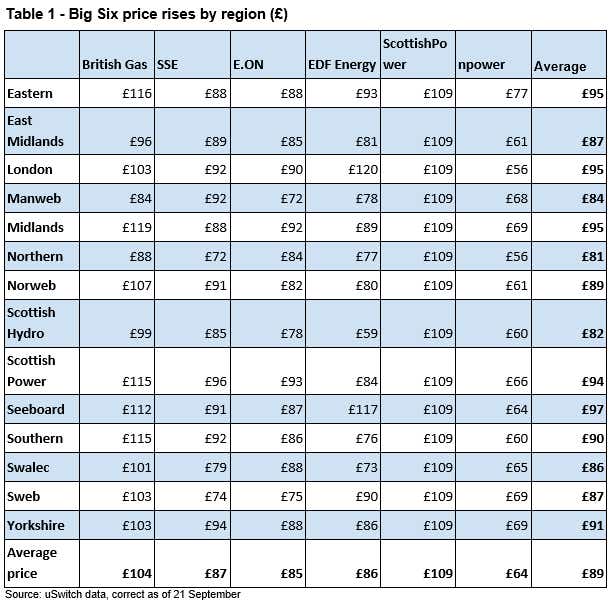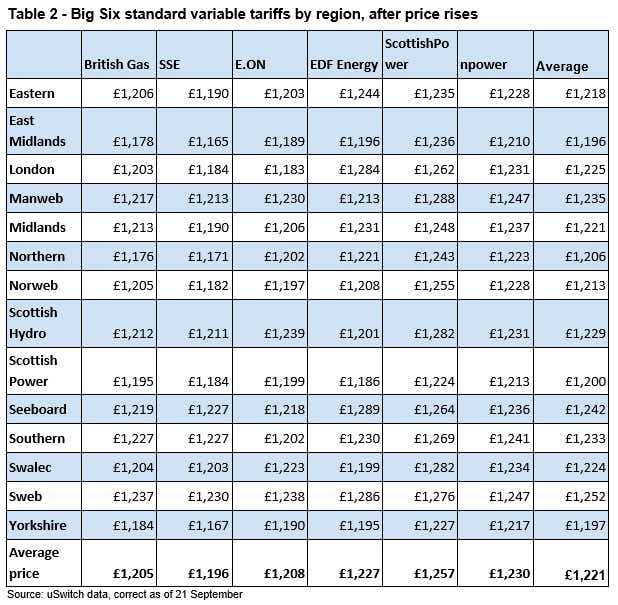Households have suffered 43 energy price rises from 30 suppliers so far in 2018 – a rate of over one per week[1] – totalling £840 million a year[2]
Regional price differences mean some customers face double the hike, with one supplier increasing prices between £59 and £120 a year depending on where you live[3]
The costliest standard tariffs from the Big Six are EDF Energy in south east England (£1,289), ScottishPower in parts of northern England and Wales (£1,288) and EDF Energy in London (£1,284)[4]
Overall, ScottishPower has increased prices the most amongst the Big Six (£109) but Economy Energy customers have witnessed a massive £311 hike[5]
Households are urged to show energy companies they won’t be taken for granted and save up to £482 by switching supplier[6].
Just days before British Gas’ and ScottishPower’s latest price rises come into effect, new analysis from Uswitch.com, the price comparison and switching service, reveals that Britain’s energy customers have so far endured an average of one price rise a week in 2018[1]. Thanks to soaring wholesale gas and electricity costs, 12 million households on standard variable tariffs now face paying a collective £840 million more for their gas and electricity[2].
A total of 43 price rises have been announced by 30 energy suppliers this year[1], and further rises may still happen in spite of the impending energy price cap. From 8 October, the average Big Six standard tariff (£1,221) will be an astonishing £362 more expensive than the cheapest deal currently on the market[7].
The price rises announced so far will affect 12 million households by an average of 7% (£70) each[2]. British Gas’ two price rises totalling 9.5% (£104)[5] have affected the most customers, adding a collective £416 million to the bills of approximately 4 million households[8]. Overall ScottishPower has increased prices the most this year amongst all the Big Six suppliers at 9.5% (£109)[5], but the largest average increase from all suppliers has been announced by Economy Energy, whose eye-watering 38% (£311) price rise will take effect on 7 October[5].
But, according to the analysis, some regions have been hit harder than others by the price increases. EDF Energy customers have seen the greatest regional differences, with price rises ranging from £59 in northern Scotland to £120 in London – twice as much on an already expensive tariff[3].
British Gas, on the other hand, has hiked bills by £119 in the Midlands compared to £84 in north west England[3].
The smallest overall price rise this year from a Big Six supplier was from npower in London and the north east of England at £56[3]. The largest – EDF Energy’s £120 rise, also in London[3] – took bills for affected customers to an astonishing £1,284[9].
When all the Big Six price rises take effect, the East Midlands will still be the area with the cheapest bills on average at £1,196[4]. This is 5% lower than those in south west England, where combined price rises will make bills the highest in the country at a staggering average of £1,252 per year[4].
British Gas and ScottishPower announced in August that bills will go up for their standard variable customers by a further £45 on average from October[5]. But it’s not just price rises that customers need to watch out for: some suppliers have also been removing their online discounts. E.ON removed online discounts worth £30 back in April[5], while most recently, OVO Energy removed their online discount which will push bills up by an additional £30 per fuel from October, on top of a 6.5% (£75) price rise announced at the same time. In total OVO customers could see bills increase by £135[10].
But the onslaught has seen households voting with their feet, and record numbers are switching to cheaper deals. To the end of August 2018, over 3.2 million customers had already moved supplier and saved money on their bills[11].
Rik Smith, Uswitch.com energy expert, says: “Rising wholesale costs have put serious pressure on energy companies in 2018, and they have responded by raising the price of their standard variable tariffs at the record breaking rate of more than one a week – adding £70 a year to bills on average.
“But many households have refused to take this lying down. Over three million have switched supplier already this year and saved up to £482 in the process. With no end in sight to increases in the cost of gas and electricity, now is the time to secure a better deal – wherever you live.
“The Government’s proposed cap on standard energy tariffs is expected to be in place by the end of 2018 December, but households stand to gain far more by switching away from these poor value plans than relying on the cap – which will change every six months and will be set at a higher level if wholesale energy costs continue to rise.”


Find out how you could save over £1,000 a year with Uswitch here.
FOR MORE INFORMATION
Ailene Barr
Phone: 020 3872 5610
Email: ailene.barr@uswitch.com
Twitter: @uswitchPR
Notes to editors
See Table 3 in body of release for full list of price rises. The 24/9/18 is week 37 of 52. 43/37 = 1.16 price rises per week so far in 2018
12 million people on SVTs: Ofgem Standard Variable Tariffs: latest trends at September 2017 - “As of September 2017, around 57% of people with the 10 largest suppliers – around 13 million customers – are on non price-protected SVTs” In February 2018, Ofgem extended the PPM price cap to a further one million vulnerable (non PPM) households, effective 1 April 2018. This leaves an estimated 12 million customers with the 10 largest suppliers on non-price protected SVTs. The average price rise in 2018 is £70. 12 million x £70 = £840 million
See table 1 in body of release. EDF Energy’s lowest price rise was £59 and highest price rise was £120. Before EDF Energy price rises this year, it’s SVT in London was priced at £1,164, compared to Scottish Hydro at £1,143.
See table 2 in body of release.
See Table 3, contact Uswitch PR for full table.
Between 1 Jan 2018 and 30 Jun 2018, at least 10% of people who switched energy supplier for both gas & electricity with Uswitch saved £482 or more.
From 8 October ScottishPower’s price rise comes into effect taking the average big six SVT to £1,221. As of 18/9/18 the cheapest tariff is £859. £1,221 - £859 = £362
Aprroximately 4 million British Gas customers affected (https://www.britishgas.co.uk/media/r/1515/why_we_re_reluctantly_increasing_our_svt_price_du) 4 million x £104 = £416 million
See tables 1 and 2 in body of release.
About us
It’s all about “U”!
Thank you for indulging us over the last 20 years by using a small ‘u’ and a big ‘S’ when writing about our brand in your articles.
We are delighted to let you know that you are now off the hook - it’s big U’s all the way (and small s’s) as we undertake our biggest ever rebrand - so let your autocorrect go wild!
About Uswitch
Uswitch is the UK’s top comparison website for home services switching. Launched in September 2000, we help consumers save money on their gas, electricity, broadband, mobile, TV, and financial services products and get more of what matters to them. Last year we saved consumers over £373 million on their energy bills alone.
Uswitch is part of RVU, a new business that also owns Money.co.uk and Bankrate.
If you would no longer like to receive our press releases please email prteam@uswitch.com with 'unsubscribe'.
